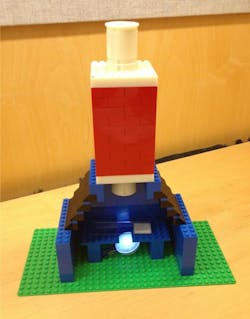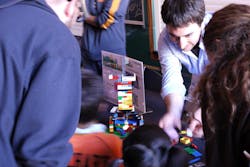An optical microscope so fun and intuitive, a kid could use it
Three University of California San Francisco (UCSF) researchers had a vision: to find a way to make optical microscopes much easier to understand and more fun to use, particularly for kids.
Harrison Liu, Michael Sachs, and Reid Williams—who are bioengineering, biomedical sciences, and biophysics graduate students, respectively—collaborated with University of California-Berkeley (UCB) and IDEO Design Consulting (Palo Alto, CA) to conceptualize and develop their idea. They also worked with Dan Fletcher at UCB, whose lab developed the CellScope mobile microscope, to create a kit based on Lego building blocks. Dubbed LegoScope, the kit allows young students and microscope enthusiasts to design custom microscopes, take and save photos, and discover the basic principles of optics and microscopy, Sachs told BioOptics World.The total cost to build LegoScope is about $250, making it affordable enough to be implemented in school classrooms. Sachs explains that he and his team are now working on a design that is around 10-fold cheaper and that uses a component lens capable of around 50x total magnification, enabling cellular-level imaging. The team is also designing a lesson plan that teachers could use as a guide for using the LegoScope in a classroom, he says.
Sachs was surprised at how quickly young kids understood how to use LegoScope when they demonstrated it at the California Academy of Sciences and the Bay Area Science Festival. "Turns out they were better at designing the stage and body than we were," he says.
For more information, please visit http://designscience.ucsf.edu/lego/home.html.
About the Author
Lee Dubay
Managing Editor
Lee Dubay is managing editor for Laser Focus World. She is a seasoned editor and content manager with 20 years of experience in B2B media. She specializes in digital/print content management, as well as website analytics, SEO, and social media engagement best practices.



